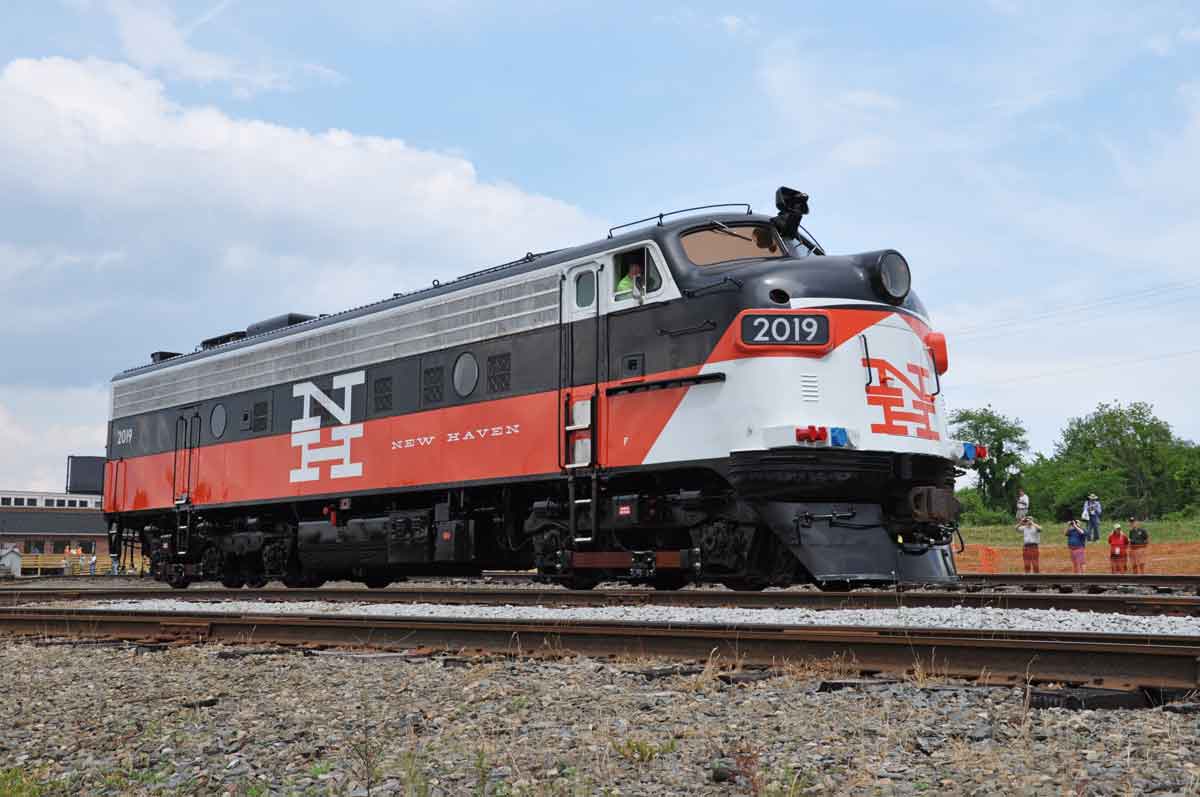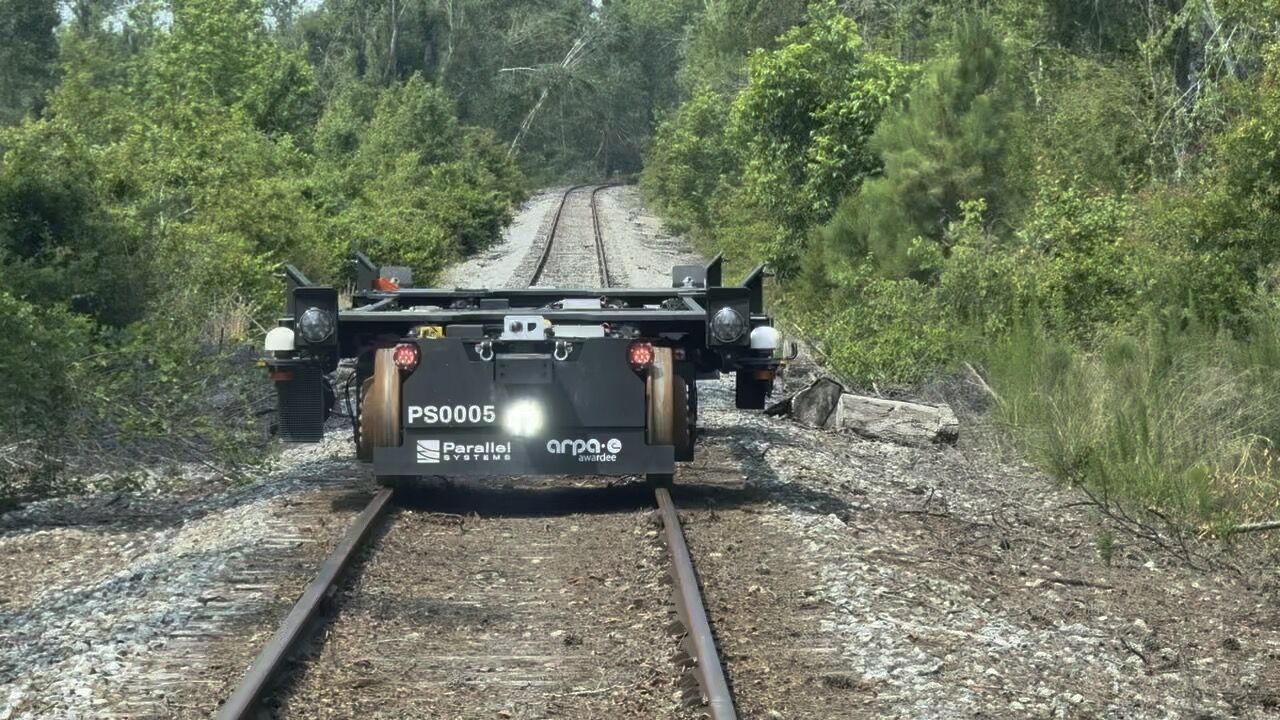Berthold is following the lead of Enderlin, N.D., after that eastern North Dakota town directed its police to do the same for Canadian Pacific trains. CP has gone to federal court to oppose the ticketing, maintaining the town’s action would illegally regulate interstate commerce.
Berthold Mayor Alan Lee said the town councilmen approved the action last month, but he wanted to check with the city attorney first. He learned there is a North Dakota Century Code that makes it a Class B misdemeanor for a railroad to block vehicle traffic for more than 10 minutes, with some exceptions.
Lee said the town would rely on state law for writing the ticket and leave it to the court judge to determine what the fine should be, if any. The town council’s motion calls for a $500 fine, but a misdemeanor of that class goes to a maximum $1,500 fine and 30 days in jail.
“It shouldn’t take more than one occurrence,” said Lee, noting the railway should get the message quickly.
Lee said the crossings are blocked often enough to present a problem for the community’s fire and ambulance services, as well as causing school buses to fall behind schedule.
He said the blockages don’t make sense given that BNSF has built double track both directions from Berthold and could hold the trains outside town on the new track.
BNSF Railway spokeswoman Amy McBeth said communities have grown up around the railroad, setting up a conflict between train and vehicle traffic.
Ideally, she said, towns would have over- or underpasses to relieve that conflict, but given the public expense to build one, the railroad tries to improve communication between train crews and dispatchers to limit the time at a crossing.
She said the new 55 miles of double track, with more planned, should help trains move more efficiently through the area.
BNSF traffic in North Dakota is at an historic high, with outbound train volume up by nearly 200 percent since 2009 and inbound up nearly 120 percent.














To every town that wants to try to resolve their rail traffic problems at grade crossings: There is a price to pay for doing it all on the cheap. You build a new road across town, and go across the tracks just to save money on an overpass, you have nobody to blame but YOURSELVES for cutting corners on such important safety features. Too many other public projects get corners cut just to save taxpayers a few more dollars and the elected representatives love to tout that when election time comes. It's like building a courthouse, prison, or school without fire sprinkler systems. Naysayers have got to learn there is NO COMPROMISE when saying "NO" to public funding for such road safety improvements, A rotten example of these naysyers down in Florida are those opposed to the All Aboard Florida project, some who are pleasure craft owners, but they should speak for themselves when they force openings of drawbridges on roadway traffic while sailing. Let's see if they will ever complain about drawbridges opening and holding up emergency vehicles. How selfish!
Suggestion: I live in a three sub-division junction in Montana (Shelby, aka "Shelberia") on the BNSF "Hi Line" (yes, I am a shareholder of Berkshire Hathaway). Our interaction and understanding with the local LEOs is non-existent. Our mayor, although a railroad enthusiast, simply doesn't get it. There is no intercourse between the Sheriff's Office and the BNSF. They are operating on different frequencies and radio procedures. (Silly '10-4' [cops] and International 'Roger' [BNSF]). I suggested, to our mayor, to have some inter-action. No reply, to date. Maybe he ate too much lutefisk and lefse over the holidays…
I would like to see a "Ride Along" program, offering LEOs a seat in our 24/7 BNSF "Oil Local", to see what goes on, on the right-of-way, and understand the different vernaculars. I guess that having inter-operable radio communications would be too much to ask. The FCC and FRA would have a 'hissy fit'! "Damn! UAVs inspecting railroad ROWs and bridges? Horrors! They'll just fly over nudist camps all day!".
Maybe "Operation Lifesaver" would have some ideas. I check it out.
good luck with trying to get city officials to see things the right way, they just want to cause trouble. if they arrest the engineer, then that train will sit there until arelief crew shows up and who knows how long that will take.
It needs explanation by the local representative of the railroad, who needs to make themselves available to these towns who are affected. Why is a train stopped on double track? Explain that a train is not like a car but can only move under orders without creating danger to other trains and towns. Explain that you can't just split the train the middle without creating further delays except in emergency. They need to know that can get in contact with the train dispatcher in a real emergency and how to do so.
The division superintendent needs to get his/her rear in gear and handle this.
Dan, I do that too LOL! A 130 car train always takes a long time at 5 mph. I am always quick to hit my counter so I can resume track speed as soon as I clear the crossing. Repeat offenses are few LOL!
Oh and by the way, giving a crew the finger when we finally get moving is NOT a good idea. We always slowed down when that happened…ALWAYS.
Cities in Michigan tried to get the class 1 I worked for on this for years. The class 1 took them to Federal District Court in Cinncinnati where the cities LOST. When following federal law, such as an airtest, hours of service, red signals, etc, etc the cities have no recourse, federal law trumps all. While we ALWAYS TRIED to not block corssings sometimes it is NOT POSSIBLE to clear everything in a timely manner. We tried to memorize locations of signals and crossings and TRIED to park trains in spots that would minimize disruptions but can't always be done….and that was with 6000 foot trains. Now they run 9 to 10 thousand foot trains…well best of luck with all that!
Must be a hoot to try to drive around Chitown these days….and I don't really care anymore cause I am retiring. 8-). No fun anymore.
Paul Cultler,
Your story, no ,i know it's a report, 's wonderful. I'm an Armed Forces Police officer, well, 45 years ago, but colleagues, cohorts, comrades… they thought, though they were, in fuzzy legal areas, dominant 'cause they thought they knew it all.
.
My thoughts here are, that many of us,locomotive engineers have good stories, how many are about tragedies?
Too many….
Francis X. Carlin, I have a similar story I heard years ago from a railroad engineer I know. He was switching with a B23-7 in a yard at night. This was new because the State had just started commuter service on the line (it was previously daylight freight only). A near-by housing development included a local policeman as a resident who was apparently displeased with the noise. Said officer drove into the yard in his cruiser and walked over to the engineer's side to yell at him through the open window, saying things like, "You have to shut it down! I can't sleep with this racket. This town has a local ordinance against heavy machinery use after 10PM!" And so on. The engineer replied that local laws don't apply to railroads. As perhaps you know, officers don't like to be told they don't have authority over something they think they do. This particular sleep-deprived officer had a shorter fuse then normal, blew up and threatened the engineer with arrest if he didn't shut it down. The engineer laughed and said, "Go ahead!" The officer stormed over to the loco's front steps, climbed up the stairs and took an immediate left turn to get to the engineer. Naturally, there's no door there on a B23-7 as it is, of course, on the fireman's side. The cop looked bewildered as he said, "How do you get in to these things?" The engineer, who had just finished pumping up his train, stuck his head out the side window of the cab and called out to the officer, "Next stop, Middleboro!" like a good passenger conductor would (which was the end of the line a good 25 miles away). Gave two toots on the horn, and throttled up. The officer turned around, clambered down the stairs, and jumped off the slowly moving engine as the train accelerated out of town. That was the last anyone ever heard of it, hopefully because his sergeant told him that the engineer was right.
Really disappointed by the name calling in some of the posts here. If you have a point to make, then please do so, but do it by sticking to the facts and without personally attacking the people involved who none of you know personally and after all are only trying to do their jobs as best they can.
I live on the BNSF in Shelby, MT. We are on the main-line (Hi Line Sub.) and are a junction with the Great Falls Sub. and the Sweetgrass Sub.. Lots of traffic. Years ago, the dispatchers would visit and walk the plants. They got a good idea of where the lines converged, the local crossing and overpass system, and a better idea of the spider web they were dispatching into. I haven't heard of any such "on-the-ground" visits from Fort Worth lately. Our city ordinance allows a 15-minute blockage of road traffic. Dunno if any tickets were ever issued.
Dennis: I don't detect any 'name calling' in these comments. Delusional Progressive, be you?
Vechiles can move another direction east or west two or three miles and go across north or south. Simple as 1,2,3.
It's too bad that these blockages occur, but sometimes they're unavoidable. If a crew is aware that they'll be stopped for a lengthy period of time, they should stay off of municipal crossings to allow for local emergency response teams to have a clear route to use. It's irresponsible to block public crossings unnecessarily. If it's an emergency situation and the train cannot be moved, that can have serious consequences to the public, but there isn't much to be done about it until the train is able to move. As far as police threatening an engineer to move, or else? That just demonstrates the general public's ignorance of railroad operations. A few years ago, fellow engineer was sent to relieve an unmanned train which had been tied down (blocking a crossing). The county sheriff was there to meet the crew and threatened to arrest them. The engineer told the sheriff that he could arrest him if he wanted, but then the train would be blocking the crossing for at least another 4 hours until the railroad could get another relief crew. Needless to say, the crew was not put under arrest, and the train was moving within a few minutes.
What a bunch of morons. Railroads are private property for the most part, and the city doesn't have jurisdiction nor is it allowed to interfere with interstate commerce. And going by some 100 year old law, enacted by another bunch of morons, who have and continue to not have, the authority to make laws that interfere with interstate commerce is just a prime example of a moron's way of thinking. Case in point; the city checked with their lawyer who apparently said the city could cite the railroad and therefore interfere with the movement of interstate commerce. If this has been an on going problem, them it's only because they were and are unwilling to correct it, by building a bridge over the railroad. North Dakota, land of the conservative voter. Never pay for anything yourself, that benefits yourself, if some else will do so.
If they board the train you can have the special agent come and arrest the officer for stepping on private property
I love this.
In, should I write, during, my 42 years in engine service there were a few memorable crossing blockings::
drifting through Newark Ca. an air hose separated ( an empty auto parts cars train over 8,000 ft long ) The train bisected Newark, blocked every crossing.
I called (RR radio) and asked that the Newark police be notified that we might not move for up to an hour.
You guessed it, a person wearing a badge, minutes later showed up, tried to get on my engine, I ordered him off, then he yelled from the ground," get this train moving or i'll arrest you."
First time I thought, collect all the reverse levers, throw them as far into the weeds as I can, and go to be booked as an alleged criminal..,..
There's more events… any of us ( engineers ), can tell about them……
Although the RR's have the right of way, I'd also be concerned if a stopped train blocked the way to a response. I live in Scituate, MA, served by the Geeenbush MBTA commuter rail. As close as we are to Boston (25 miles), if an at grade crossing was blocked it would be at least a 5 mile detour to get to an emergency, which is a life or death difference. I imagine the detours in the Dakotas are much more. So as a former public safety official I totally get the local's concerns; and they need to be addressed at a federal level. Handing out a ticket is symbolic but totally ineffective; time for the FRA to get involved.
I'd hate to have emergency services delayed or have to detour due to a blocked intersection.
Does not Federal law control train movements and have the authority over them, as far as infractions go? I would think the town would have to petition the FRA to have any issues resolved.
Can the police board the locomotive to issue the ticket? After all, they don't enter one's car when giving a ticket.
The engineer is on the scene. What are the police to do? Drive to Fort Worth to ticket the dispatcher? Perhaps the local officials have already discussed this with BNSF to no effect. It's an attention getting effort.
I don't understand the purpose of ticketing the people that have the least control where and how long the train sits at a location. The engineer is just doing what dispatch allows and I don't see how issuing a ticket to the engineer begins to solve this. How about City officials, instead of trying to make a few extra cents in writing tickets, call the RR and discuss the matter with officials that can make a difference?